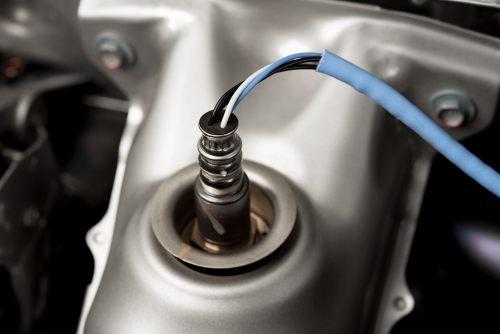P2270 is a general DTC trouble code, which means it has the same meaning for the Toyota Echo as it would any other vehicle. It means that the oxygen sensor located on bank 1 behind the catalytic converter is continuously sending voltage that indicates a lean air/fuel mixture.
This does not necessarily mean that your Echo is running lean (although it can). It’s usually caused by a bad oxygen sensor, or an exhaust leak.
How to Find Bank 1 Sensor 2
There are oxygen sensors on both sides of your Echo’s catalytic converter(s). This lets the ECM read the exhaust before and after it has run through the catalytic converter to make sure that it is functioning correctly (for emissions purposes).
Here’s what P2270 means, and how to find Bank 1 Sensor 2.
P2270: O2 Sensor Signal → Biased/Stuck Lean (Bank 1 | Sensor 2)
- Bank 1 is the side of the engine with the first cylinder. If your Echo has a four cylinder engine, you don’t have to worry about this, as there is only one cylinder head. If you happen to have more than one cylinder head, you will need to look up where cylinder one is for your particular engine. P2272 affects bank 2.
- Sensor 2 is “downstream” of the catalytic converter, which means that it is the sensor that comes after the catalytic converter. On some engine combos, there may be a second sensor after the catalytic converter, but if that were causing the problem, you’d be dealing with P2274.
P2270 Symptoms: Toyota Echo

There are usually no symptoms associated with P2270. The code is indicating that the signal coming from your Echo’s downstream oxygen sensor at B1S2 is leaner than it should be. The signal from the oxygen sensor upstream of the catalytic converter does not agree with the lean condition indicated by the downstream oxygen sensor. If it did, you’d have P0171.
There are usually no drivability issues when P2270 appears by itself.
Toyota Echo: P2270 Causes
Here are some of the more common causes of P2270 in the Toyota Echo.
Exhaust Leak (Highly Likely)
An exhaust leak is one of the more common reasons why this code is thrown. If an exhaust leak is big enough to cause P2270, it’s probably going to be large enough to make some noticeable noise.
Oxygen Sensor (Highly Likely)

If you aren’t hearing an exhaust leak, the most likely cause of P2270 is a bad O2 sensor. Take a look at the wiring going to it and see if it looks cracked or corroded. Oxygen sensor wiring harnesses (due to it’s proximity to the exhaust system) have some of the roughest lives of any automotive wiring.
You can check the wiring harness with a multimeter set to OHMS. Check the resistance compared to the factory specs. Or if you have dual exhaust, check it vs the other downstream O2 sensor.
You can also check the voltage at the oxygen sensor if you have a good scan tool. It should fluctuate as you press the gas. If it’s stuck at 0, that would indicate that the sensor itself is bad.
Other Causes
- Low fuel pressure
- Loose O2 sensor
- Bad fuel injector at bank 1
- Bad purge valve
- Bad PCM
Conclusion: P2270 Toyota Echo
It’s normally the oxygen sensor that needs replaced when P2270 appears in the Echo. But, there can be other issues as well. Good luck diagnosing the code.

